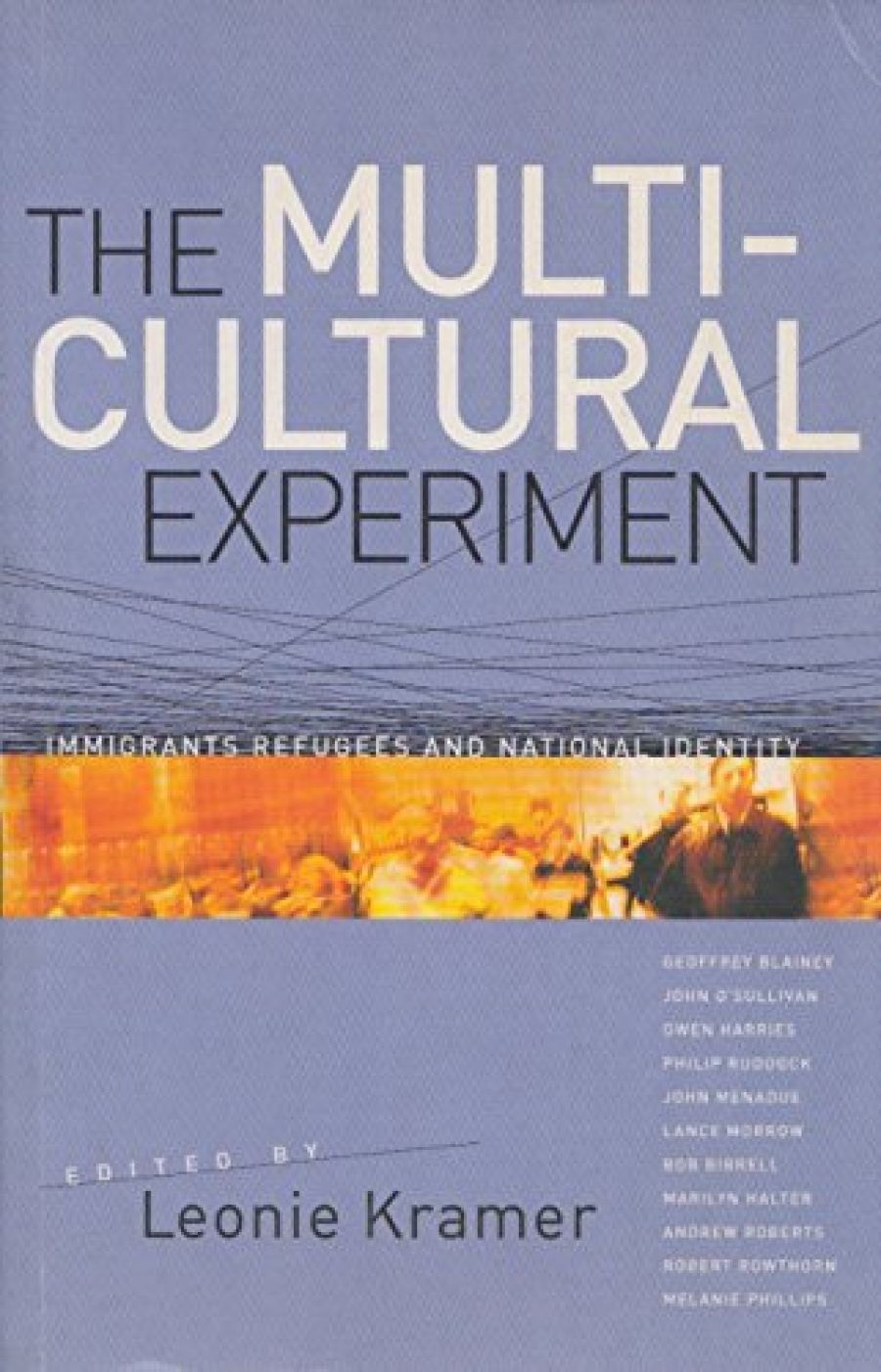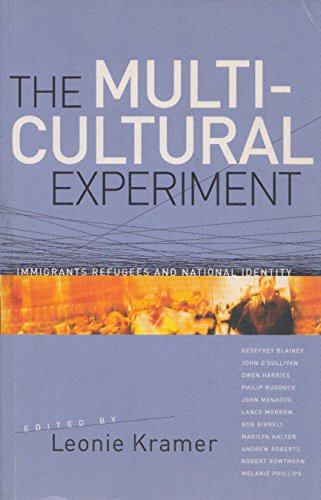
- Free Article: No
- Contents Category: Cultural Studies
- Custom Article Title: Closed Chat
- Review Article: Yes
- Article Title: Closed Chat
- Online Only: No
- Custom Highlight Text:
These eleven papers are the product of the most recent of the Boston, Melbourne, Oxford Conversazione on Culture and Society, which, Leonie Kramer tells us in her brief introduction, has succeeded in attracting ‘leading scholars and experts in their fields’ and in remaining distinguished by ‘freedom from political restraints and the narrow debates that these engender’. However, there’s not much sign here of the ‘informal intensive and extended probing of issues’, or of ‘interaction with speakers over two days’. None of the discussion (one presumes there was discussion) is reproduced, and I counted only two cross-references.
- Book 1 Title: The Multicultural Experiment
- Book 1 Subtitle: Immigrants, refugees and national identity
- Book 1 Biblio: Macleay Press, $29.95 pb, 192 pp
- Book 1 Cover Small (400 x 600):

- Book 1 Cover (800 x 1200):

While it may be true, as Kramer assures us, that any attempt at summing up ‘would defeat the purpose of the process, which is to stimulate and observe the interplay of new ideas, not to resolve differences in order to arrive at an artificial consensus’, the essential problem with this symposium is that there is a very large degree of consensus among the speakers: four Australians, two Americans, three from the UK, and two of varied national and scholarly experience. Australia is represented by Bob Birrell, Geoffrey Blainey, John Menadue and no less than the then Immigration Minister Philip Ruddock, who is allowed to give a free plug for the Howard Government’s policies, with not a word about refugee issues and the Tampa episode. The Howard–Ruddock performance over the Tampa, though trenchantly criticised by Menadue, is defended generously by two speakers (John O’Sullivan and Owen Harries).
The inclusion of notable conservatives on immigration and refugee policy – Blainey (though he is admirably restrained here) and Birrell – rather than eminent immigration scholar-historians such as Charles Price and James Jupp, makes one suspicious at the outset. Kramer rather narrowly defines the common themes and pressing questions: ‘Should migrants adopt the customs and traditions of the host country or [sic] create separate enclaves within it? What happens if a conflict creates problems of divided loyalties?’ Melanie Phillips, a journalist who sees herself as ‘defending liberal values against the attempt to destroy Western culture from within’, leads with a diatribe against illegal asylum seekers and unneeded migrants who, flooding into Britain, threaten indigenous society and the transmission of ‘a national story’: ‘Britain is not a multicultural society. Its national story is of an ancient history and culture. The nature of its institutions and its values derives from particular traditions such as English Protestantism, the class system and the common law – not to mention the fact that the British are an island people whose weather is damp and cold.’ (Well, we can agree that the weather is often damp and cold.) Furthermore, ‘our intelligentsia’ have turned the British education system into an engine of multiculturalism, ‘the doctrine that divides people and encourages tribal loyalties’. This ‘conversation starter’, from the winner in 1996 of the Orwell Prize for journalism, is complemented by Andrew Roberts’s lament for the Britain before the black deluge. Roberts slates the ineptitude and cowardice of the politicians who produced what Churchill described as the ‘Magpie Society’. Robert Rowthorn forecasts that, at current rates of ingress, by 2050 Britain’s overseas born will be thirteen per cent of the population and the ethnic (non-British) settlers twenty per cent, for they are out-settling and out-breeding the indigenous Brits.
The symposium only rarely rises above this level. Short on definitions of the central concepts it purports to discuss – national identity, multiculturalism, ethnicity and race – most of the speakers assume that national cohesion and cultural identity are to be predicated on some form of ethnic or ‘racial’ homogeneity. None of the British or Australian speakers, of English, Scottish, Welsh and Irish ancestry, bothers to reflect on his or her own shared British identity, forged from these diverse origins. It seems that everyone finds simply unimaginable a shared identity forged from diverse peoples in the UK and Australia.
Most contributors agree that there is a world refugee crisis and that asylum seekers pose a threat to host societies in Europe, Britain and Australia because of their sheer numbers, the ethnic and cultural differences they bring, and the insidious doctrine of multiculturalism (O’Sullivan, Harries), which reverses the old expectation that newcomers should assimilate to existing cultural norms. Those who support large-scale immigration and generous refugee settlement are characterised, sometimes rather sneeringly, as ‘internationalists’ (Blainey) holding the nation state and civic nationalism in contempt; as cultural relativists forcing their ‘snobbish aestheticism’ (O’Sullivan) on others; and as an intelligentsia contemptuous of democratic rights. Birrell identifies in Australia ‘a formidable political alliance’ between ‘an ethnic movement’ and ‘Australia’s intelligentsia’, which drives or will soon be driving immigration and refugee policies. Most contributors see little value in the social diversity that migrants and refugees bring. For Birrell, Australian diversity (the twenty-three per cent of the population born overseas) threatens social cohesion – ‘the social glue which helps hold a society together’. The evidence employed to leaven this rightist intellectual fudge is usually of the worst-case variety: ethnic strife in Fiji, and the horror story of ‘what the Hmong did to Wausau, Wisconsin’. For Blainey, it seems, the further away in time the refugee incursion – the French Huguenots in Britain, the Puritans in America, the Jews fleeing Hitler in the 1930s – the more benign its influence; the closer in time, the more ambiguous the legacy. For Australia, the post-1945 refugees represent a plus, whereas for the post-1975 (read, the largely non-Europeans) ‘the jury is still out’.
There is something sickening about advocates of a traditional Anglo-Britain – the imperial Britain that historically imposed its will on ‘the lesser breeds’ by invading, expropriating and undermining traditional societies around the globe with traders, settlers and missionaries – fulminating from the high moral ground against a relatively minor reverse population movement from the periphery to the centre. And there’s something bizarre about thinkers who fear international covenants and bodies for the threat they pose to national sovereignty. Apart from Harries, who calls for ‘a firm, controlled, effective non-racist policy on immigration’ across the European Union, there’s hardly a concrete positive proposal to be found in this volume with which to address an undeniably global refugee problem.
The American contributors, Lance Morrow and Marilyn Halter, offer a breath of fresh air. Morrow asserts that the notion of the US as ‘a nation of immigrants’ is sacred, ‘a binding force and an item of civic nationalism’. He takes heart from the absence of any virulent backlash against Muslims in the US since September 11. ‘Immigration is America’s continuing raison d’être and its continuing justification. Immigration is not an incidental generosity or mere gesture of noblesse oblige, but is the heart of the American idea. Without immigration, there is no America, economically, culturally, morally … America has aspired from the start to a universality that can be fulfilled only by universal inclusion.’ Are settler societies fundamentally different in their attitudes to immigrants and refugees than imperial, settling societies? Halter suggests that ‘the United States is the quintessential immigrant nation’ because all except indigenous people can trace their ancestry to migratory roots. But why does Australia appear to lack an abiding sense of itself as an immigrant nation? Why is there such a miserable, carping tone (as evidenced in this book) to so much of our discussion of immigrants and refugees? Now that would be worth a symposium.


Comments powered by CComment